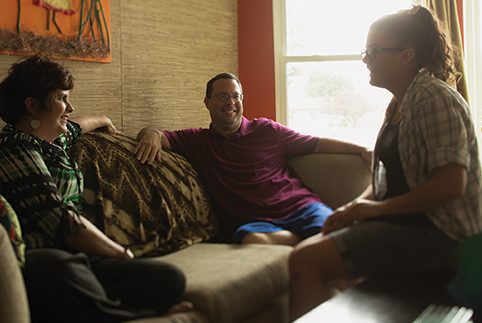Brian Higginbotham’s work strengthening families has earned him the Young Alumni Distinguished Service Award.
A passion for serving families prompted Brian J. Higginbotham (BS ’00) in his choice of profession as an educator. His programs strengthening stepfamilies, couples, parent-child relationships, and military families have made him a leader among family-life professionals.
Higginbotham, the associate vice president for Utah State University Extension, is BYU’s 2013 Young Alumni Distinguished Service Award recipient. He says growing up in a wonderful home with nurturing parents and having an equally satisfying marriage propel his desire to help others.
“I am so grateful for my family, yet professionally as a therapist and also as a missionary, I have seen many families that lack the stability, happiness, unity, and harmony I have had,” he says.
To help strengthen families, Higginbotham cowrote the Utah Marriage Handbook, which is widely and freely distributed in Utah high schools, in county clerks’ offices, and online. He also develops high-impact programs that support families and respond to public needs.
A primary focus for Higginbotham is stepfamilies. He notes that one-third of all Utah unions are remarriages, and the vast majority of these bring children from previous relationships.
“All families, regardless of their structure, have to communicate, deal with conflict, handle finances, and manage children, if they have them,” he explains. “But with stepfamilies, there is often another adult in the mix.” Because courts increasingly allow shared custody, children go between two households and are often exposed to different expectations, value systems, and rules. “Dealing with the child in effective ways without bad-mouthing the other parent can be challenging,” he adds. “Resentments can arise regarding finances, and, of course, there’s a non-biological adult in a parental role that can lead to tensions among parents and children.”
Higginbotham presents the research to stepfamilies in a way that makes sense to them and that they can easily implement. He provides a free six-week stepfamily-education course called Smart Steps for Stepfamilies, which more than 4,000 adults and 3,500 youth have taken.
His research on stepfamilies is also having an impact on the field’s sensitivity to cultural differences. For instance, Higginbotham has identified ways a Latino stepfamily may differ from a Caucasian one and has created a curriculum to be more sensitive to their different culture.
“It is no surprise that families want to be happy and successful,” Higginbotham says. “But as we study families around the country, we are seeing a ‘microwave generation,’” or a generation accustomed to having things at the click of a button. “That mentality is also borne out by how we use our apps and television,” he adds. “Successful relationships require a different mentality and skill set. You can’t just click a button when you don’t like what your spouse says and flip to another channel. You must learn how to deal with those feelings in ways that help, not hinder, the relationship.”
And it’s never too early or too late to learn how to succeed in a marital relationship. “Preventing bad relationships is just as important as supporting good ones,” Higginbotham says. That is why he annually directs premarital-
education classes to help people make good relationship choices—whether they are divorced, widowed, or have never been married. “One night,” he says, “a woman in her late 70s entered the classroom and asked if she could receive relationship education. When we said yes, she said, ‘Good, that’s what I need. Because if I ever remarry, I don’t want him to be a jerk.’”
— Charlene Renberg Winters (BA ’73, MA ’96)









